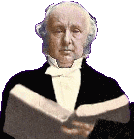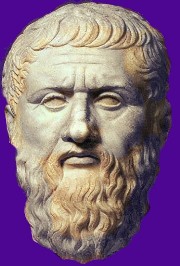PLATO
EUTHYDEMOS
380 BC IN FOUR WEBPAGE PARTS - PART FOUR
Translated by

Benjamin Jowett (1817-1893)
Benjamin Jowett (15 April 1817 - 1 October
1893) was an English scholar, classicist
and theologian. Noted as one of the greatest
British educators of the 19th century, he
was renowned for his translations of Plato
and as an outstanding and influential tutor.
He was Master of Balliol College, Oxford.
|
|
Plato (Greek Pláton, "broad" 428/427
BC - 348/347 BC), was a Classical Greek philosopher,
mathematician, student of Socrates, writer
of philosophical dialogues, and founder of
the Academy in Athens, the first institution
of higher learning in the Western world.
Along with his mentor, Socrates, and his
student, Aristotle, Plato helped to lay the
foundations of Western philosophy and science.
Euthydemus (Euthydemos), written 380 BCE,
is dialogue by Plato which satirizes what
Plato presents as the logical fallacies of
the Sophists. It describes a visit paid by
Socrates and various youths to two brothers,
Euthydemus and Dionysodorus, both of whom
are prominent Sophists. The main purpose
of Euthydemus is to contrast Socratic argumentation
and education with those of Sophism, to the
detriment of the latter. As in many of the
dialogues, the two Sophists whom Socrates
argues against, Euthydemus and Dionysodorus,
were indeed real people. Euthydemus was somewhat
famous at the time the dialogue was written,
and is mentioned several times by both Plato
and Aristotle. Likewise, Dionysodorus is
mentioned by Xenophon. The dialogue contrasts
Socrates' manner with that of the brothers.
Throughout the dialogue, Euthydemus and Dionysodorus
continually attempt to ensnare Socrates with
what are presented as deceptive and meaningless
arguments, primarily to demonstrate their
professed philosophical superiority. Plato
defines Euthydemus' and Dionysodorus' argumentation
as 'eristic'. This literally means "designed
for wrangling" ('eris' meaning 'strife'
in Greek). No matter how one attempts to
refute eristic arguments, the argument is
designed so that any means of refutation
will fail. For example, at one point, Euthydemus
attempts to prove the impossibility of falsehood. (wikipedia)
|
Plato EUTHYDEMUS
CONTINUED FROM PART THREE
Socrates: Such was the discussion,
Crito; and after a few more words had passed
between us we went away. I hope that you
will come to them with me, since they say
that they are able to teach any one who will
give them money; no age or want of capacity
is an impediment. And I must repeat one thing
which they said, for your especial benefit,-that
the learning of their art did not at all
interfere with the business of money-making.
Crito: Truly, Socrates, though I am curious
and ready to learn, yet I fear that I am
not like minded with Euthydemus, but one
of the other sort, who, as you were saying,
would rather be refuted by such arguments
than use them in refutation of others. And
though I may appear ridiculous in venturing
to advise you, I think that you may as well
hear what was said to me by a man of very
considerable pretensions-he was a professor
of legal oratory-who came away from you while
I was walking up and down. "Crito,"
said he to me, "are you giving no attention
to these wise men?" "No, indeed,"
I said to him; "I could not get within
hearing of them-there was such a crowd."
"You would have heard something worth
hearing if you had." "What was
that?" I said. "You would have
heard the greatest masters of the art of
rhetoric discoursing." "And what
did you think of them?" I said. "What
did I think of them?" he said:-"theirs
was the sort of discourse which anybody might
hear from men who were playing the fool,
and making much ado about nothing. "That
was the expression which he used. "Surely,"
I said, "philosophy is a charming thing."
"Charming!" he said; "what
simplicity! philosophy is nought; and I think
that if you had been present you would have
been ashamed of your friend-his conduct was
so very strange in placing himself at the
mercy of men who care not what they say,
and fasten upon every word. And these, as
I was telling you, are supposed to be the
most eminent professors of their time. But
the truth is, Crito, that the study itself
and the men themselves are utterly mean and
ridiculous." Now censure of the pursuit,
Socrates, whether coming from him or from
others, appears to me to be undeserved; but
as to the impropriety of holding a public
discussion with such men, there, I confess
that, in my opinion, he was in the right.
Socrates: O Crito, they are marvellous men;
but what was I going to say? First of all
let me know;-What manner of man was he who
came up to you and censured philosophy; was
he an orator who himself practises in the
courts, or an instructor of orators, who
makes the speeches with which they do battle?
Crito: He was certainly not an orator, and
I doubt whether he had ever been into court;
but they say that he knows the business,
and is a clever man, and composes wonderful
speeches.
Socrates: Now I understand, Crito; he is
one of an amphibious class, whom I was on
the point of mentioning-one of those whom
Prodicus describes as on the border-ground
between philosophers and statesmen- they
think that they are the wisest of all men,
and that they are generally esteemed the
wisest; nothing but the rivalry of the philosophers
stands in their way; and they are of the
opinion that if they can prove the philosophers
to be good for nothing, no one will dispute
their title to the palm of wisdom, for that
they are themselves really the wisest, although
they are apt to be mauled by Euthydemus and
his friends, when they get hold of them in
conversation. This opinion which they entertain
of their own wisdom is very natural; for
they have a certain amount of philosophy,
and a certain amount of political wisdom;
there is reason in what they say, for they
argue that they have just enough of both,
and so they keep out-of the way all risks
and conflicts and reap the fruits of their
wisdom.
Crito: What do you say of them, Socrates?
There is certainly something specious in
that notion of theirs.
Socrates: Yes, Crito, there is more speciousness
than truth; they cannot be made to understand
the nature of intermediates. For all persons
or things, which are intermediate between
two other things, and participate in both
of them-if one of these two things is good
and the other evil, are better than the one
and worse than the other; but if they are
in a mean between two good things which do
not tend to the same end, they fall short
of either of their component elements in
the attainment of their ends. Only in the
case when the two component elements which
do not tend to the same end are evil is the
participant better than either. Now, if philosophy
and political action are both good, but tend
to different ends, and they participate in
both, and are in a mean between them, then
they are talking nonsense, for they are worse
than either; or, if the one be good and the
other evil, they are better than the one
and worse than the other; only on the supposition
that they are both evil could there be any
truth in what they say. I do not think that
they will admit that their two pursuits are
either wholly or partly evil; but the truth
is, that these philosopher-politicians who
aim at both fall short of both in the attainment
of their respective ends, and are really
third, although they would like to stand
first. There is no need, however, to be angry
at this ambition of theirs-which may be forgiven;
for every man ought to be loved who says
and manfully pursues and works out anything
which is at all like wisdom: at the same
time we shall do well to see them as they
really are.
Crito: I have often told you, Socrates, that
I am in a constant difficulty about my two
sons. What am I to do with them? There is
no hurry about the younger one, who is only
a child; but the other, Critobulus, is getting
on, and needs some one who will improve him.
I cannot help thinking, when I hear you talk,
that there is a sort of madness in many of
our anxieties about our children:-in the
first place, about marrying a wife of good
family to be the mother of them, and then
about heaping up money for them-and yet taking
no care about their education. But then again,
when I contemplate any of those who pretend
to educate others, I am amazed. To me, if
I am to confess the truth, they all seem
to be such outrageous beings: so that I do
not know how I can advise the youth to study
philosophy.
Socrates: Dear Crito, do you not know that
in every profession the inferior sort are
numerous and good for nothing, and the good
are few and beyond all price: for example,
are not gymnastic and rhetoric and money-making
and the art of the general, noble arts?
Crito: Certainly they are, in my judgment.
Socrates: Well, and do you not see that in
each of these arts the many are ridiculous
performers?
Crito: Yes, indeed, that is very true.
Socrates: And will you on this account shun
all these pursuits yourself and refuse to
allow them to your son?
Crito: That would not be reasonable, Socrates.
Socrates: Do you then be reasonable, Crito,
and do not mind whether the teachers of philosophy
are good or bad, but think only of philosophy
herself. Try and examine her well and truly,
and if she be evil seek to turn away all
men from her, and not your sons only; but
if she be what I believe that she is, then
follow her and serve her, you and your house,
as the saying is, and be of good cheer.
-THE END-
|














